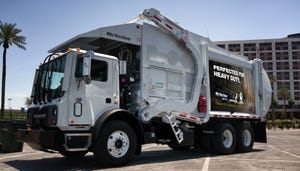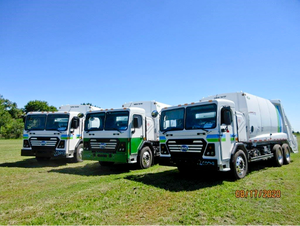INTERNATIONAL: Composting Generates Interest Among Europeans
August 1, 1994
Ann Kulik
Many European countries, with a domestic waste stream high in organic content, are tapping into the potential of composting to conserve landfill space.
France, for example, produces 650,000 metric tons of compost annually from 1.5 million metric tons of organic material, and Spain was reportedly processing about 20 percent of its organic wastes into compost as of last year.
Even the smaller countries are taking large strides. The Netherlands, for example, is raising its present goal to treat 750,000 metric tons of organics to 1 million metric tons by January 1995. Belgium has six plants that compost an estimated 120,000 metric tons of organic wastes each year, and in Switzerland, the canton of Zurich processes 140,000 metric tons of organic waste in its composting plants.
Centralized composting in Europe basically occurs in two forms: bulk processing of mixed municipal solid waste in countries such as France, Spain, Portugal, Italy and Greece; and composting of the separated organic waste stream, as in the Netherlands and Germany, where laws limit the percentage of organic wastes allowed in landfills. Austria also has largely abandoned mixed waste composting.
Since January 1994, separate collection of green, fruit and garden (GFT) waste must be provided in all Dutch communities. After separate green, fruit and garden collection was introduced in the province of South Holland, collected quantities tripled in 1992 as compared to the 1991 rate.
Since the 1993 Packaging Decree, the French have started to introduce separate containers for collecting packaging, fermentable materials and the remaining household waste.
In Germany, biowaste collection was made available to 10 percent of the residents in the fall of 1993 and is now being expanded to additional communities. There are presently about 100 composting facilities in operation and 17 are under construction. The country plans to boost the processing capacity to 2.4 million metric tons annually as early as 1995, at an investment of 800 to 1,000 German marks (approximately $488 to $610) per metric ton. The composting capacity needed to blanket the country has been estimated at 4 to 4.5 million metric tons (see chart on page 10).
While composting increases, Europeans have yet to find sufficient markets for the volumes of compost that are processed each year.
In response to this problem, MullMagazin articles have offered several suggestions:
* Market-oriented strategies and end-use considerations should be an integral part of the planning process, replacing the typical approach of generating compost and then seeking users. The 1993 German Technical Directive for Municipal Solid Waste requires facility permit documents to include a projection of the market potential as well as a marketing and distribution plan.
* Policies that encourage procurement by public entities should be adopted.
* Projects should be developed with input from all parties involved with the project- including the compost marketer and end user - rather than simply contracting with a third party to provide the facility and service.
* Compost can find a market only by supplanting other products. The key is product diversification based on various reproducible levels of compost quality. This approach satisfies horticultural and agricultural users' need for reliable standards while allowing quality-based pricing.
* A marketable product cannot emerge from a substandard feedstock. Citizens have to be taught which materials can be included in their biocontainers.
* Production facilities should be close to the distributors or end users to control transport costs.
* Composting at central facilities must complement backyard composting, rather than compete against residents' efforts.
You May Also Like


